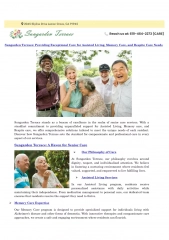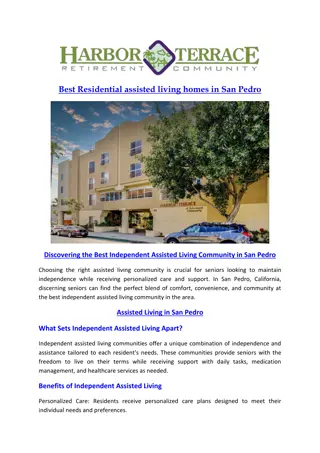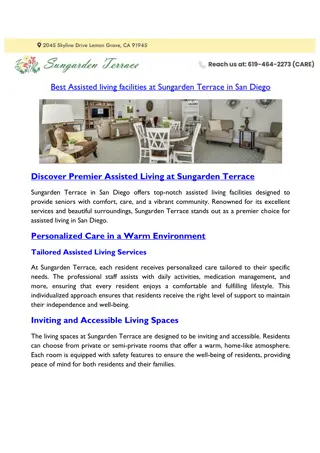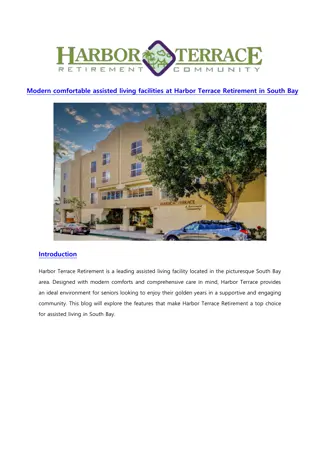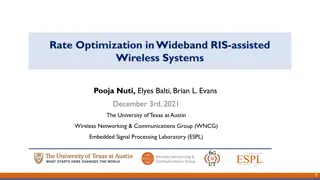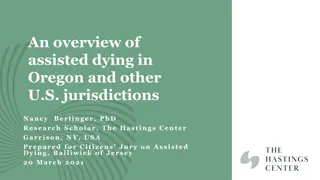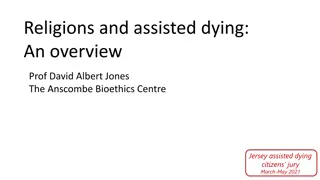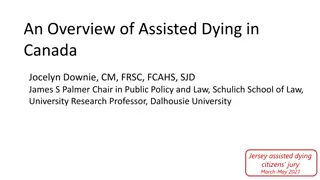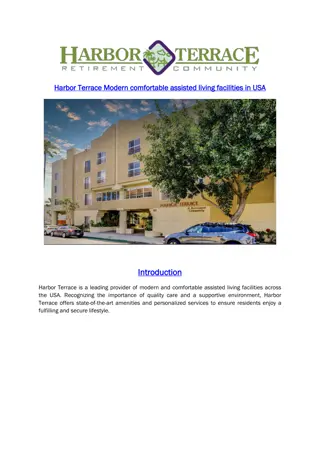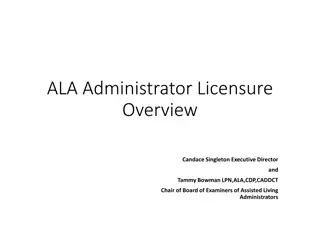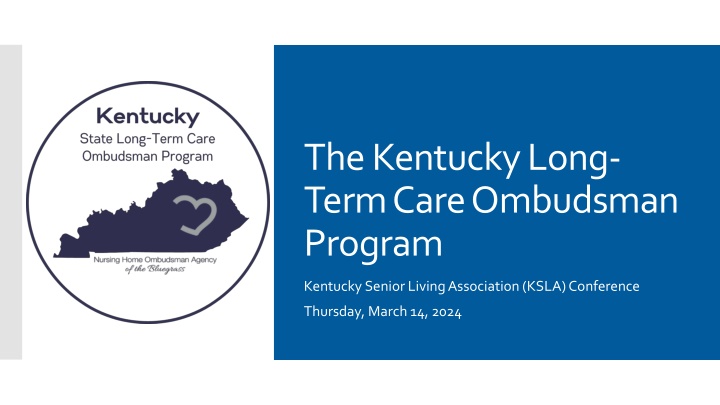
The Kentucky Long-Term Care Ombudsman Program
Learn about the role of the Kentucky Long-Term Care Ombudsman Program (LTCOP) in advocating for residents living in various care facilities. Discover how LTC Ombudsmen work to resolve complaints, protect residents' rights, and promote quality care in long-term care settings.
Download Presentation

Please find below an Image/Link to download the presentation.
The content on the website is provided AS IS for your information and personal use only. It may not be sold, licensed, or shared on other websites without obtaining consent from the author. If you encounter any issues during the download, it is possible that the publisher has removed the file from their server.
You are allowed to download the files provided on this website for personal or commercial use, subject to the condition that they are used lawfully. All files are the property of their respective owners.
The content on the website is provided AS IS for your information and personal use only. It may not be sold, licensed, or shared on other websites without obtaining consent from the author.
E N D
Presentation Transcript
The Kentucky Long- Term Care Ombudsman Program Kentucky Senior Living Association (KSLA) Conference Thursday, March 14, 2024
Ombudsman [om-buhdz-muhn] is a Swedish word for advocate. An ombudsman is an agent, representative, or someone who speaks on behalf of another. What s a Long- Term Care Ombudsman? LTC Ombudsmen are not neutral ombudsmen act at the direction of the resident. Our goal is resolution to the satisfaction of the resident. LTC Ombudsmen serve residents living in Kentucky s nursing homes, assisted living facilities, personal care homes, and family care homes.
Office of the State Long- Term Care Ombudsman Program Structure & Staff 15 District LTC Ombudsman Programs Full-Time Find our directory of District LTCO Programs and the counties they serve at www.ombuddy.org District Ombudsman Part-Time Volunteers Ombudsman Staff
Visit LTC facilities unannounced at least every 90 days; Identify, investigate, and resolve complaints made by or on behalf of residents; Provide information to residents about long-term care services and their rights; Represent the interests of residents before governmental agencies and seek administrative, legal, and other remedies to protect residents; Analyze, comment on, and recommend changes in laws and regulations pertaining to the health, safety, welfare, and rights of residents; Educate and inform consumers and the public regarding issues and concerns related to LTC; Promote the development of citizen organizations; Support for the development of resident and family councils; and Advocate for changes to improve residents quality of life and care. Long-Term Care Ombudsman Program Goals
The Long-Term Care Ombudsman Program (LTCOP) works to resolve problems related to the health, safety, welfare, and rights of individuals who live in LTC facilities. The LTCOP does NOT focus on the best interests of the residents. Ombudsmen are resident focused. We work to resolve problems to the satisfaction of residents. Unique Qualities of the LTCOP The LTCOP operates under federal consent and confidentiality requirements of the Older Americans Act specifically for the LTCOP. LTCO are not mandatory reporters.
Rights of Access. (1) Kentucky, regional, volunteer, and district ombudsmen shall have unrestricted access to long-term care facilities: (a) Without prior notice; (b) To meet with one (1) or more residents; and (c) To observe the operation of the facility as it affects the patient. If an ombudsman is denied entry to a long-term care facility, the ombudsman shall inform the: (a) Administrator or operator of the statutory authority for access. If access is still denied, the ombudsman shall inform the (b) Kentucky long-term care ombudsman; (c) Office of Inspector General, Division of Health Care; and (d) Local law enforcement officials to secure assistance for entry if entry into a facility is denied. The LTCOP and Rights of Access Willful interference, as governed by KRS 216.541(3), with representatives of the Kentucky Long-term Care Ombudsman Program in the performance of official duties shall be unlawful and result in a fine of $100 to $500 for each violation. (b) Each day the violation continues shall constitute a separate offense.
Assisted Living and the Ombudsman: Passage of Senate Bill 11 by KY General Assembly 2022: Modernizing Kentucky s long-term care continuum KY Revised Statue Amended & effective July 14, 2022: Assisted Living defined as long-term care facility, which extends residents rights and ombudsman services to ALC residents Why are we getting to know each other? Kentucky LTC ombudsmen began serving assisted living facility residents in October 2022
In Calendar Year 2023, the Kentucky Long-Term Care Ombudsmen: Made 875 visits to ALC residents Educated 2,027 residents, families, and individuals about issues in long-term care Consulted with 361 ALC facility staff members about issues impacting their residents Attended 45 Resident Group Meetings to educate ALC residents of their rights Investigated and resolved 78 complaints on behalf of ALC residents Assisted Living and the Ombudsman: How are things going?
Assisted Living Community Complaints: 78 Complaints in 2023 3 complaints were initiated by the ombudsman representative 45 complaints were initiated by the resident 34 complaints were initiated by the resident s representative, friend, or family Who, What, Why? 3 complaints were initiated by an unknown, anonymous complainant
78 Complaints in 2023: 4 complaints of Abuse, Neglect, Exploitation (5%) 4 complaints re: Access to Records (5%) Assisted Living Community Complaints: 3 complaints re: Admissions, Discharge, Room issues (4%) 28 complaints re: Rights, Autonomy, Dignity & Respect (36%) 4 complaints re: Billing, Personal Property (5%) 4 complaints re: Basic Care Needs (5%) 3 complaints re: Activities (4%) Who, What, Why? 5 complaints re: Dining & Hydration (6%) 6 complaints re: Environmental Issues (8%) 14 complaints re: Staffing, Administrative Oversight (18%) 2 complaints re: Outside Parties (2%)
78 Complaints in 2023: 4 complaints of Abuse, Neglect, Exploitation (5%) 4 complaints re: Access to Records (5%) Assisted Living Community Complaints: 3 complaints re: Admissions, Discharge, Room issues (4%) 28 complaints re: Rights, Autonomy, Dignity & Respect (36%) 4 complaints re: Billing, Personal Property (5%) 4 complaints re: Basic Care Needs (5%) 3 complaints re: Activities (4%) Who, What, Why? 5 complaints re: Dining & Hydration (6%) 6 complaints re: Environmental Issues (8%) 14 complaints re: Staffing, Administrative Oversight (18%) 2 complaints re: Outside Parties (2%)
Ombudsmen are federally mandated to provide all long-term care residents with regular access to ombudsman services. Assisted Living Community Complaints: Most residents in long-term care do not know about the additional rights they have. Many residents do not feel comfortable exercising their rights. Residents may have a sense of defeatism if previous concerns went unaddressed. Who, What, Why? The ombudsman program is another avenue for residents to learn about their rights and how to exercise them. The program is also a great way for facility staff to learn about Residents Rights and how to support residents in exercising them.
Kentucky Statute 216.515 Rights of Residents - Duties of Facilities Be informed, in writing, of all services available Be informed before admission & quarterly of service charges the resident is responsible for paying Kentucky Residents Rights: Be informed, in writing, of residents responsibilities and rights Be informed of their medical condition To access inspection reports on the facility Rights to be Informed https://apps.legislature.ky.gov/law/statutes/statute.aspx?id=52527
Kentucky Statute 216.515 Rights of Residents - Duties of Facilities Privacy: during visitation in communications (including mail), during treatment & care, and in meetings with the LTCO, APS, and facility inspectors Kentucky Residents Rights: To share a room (unit) with their spouse To have their medical records kept confidential Rights to Privacy & Confidentiality To have access to a telephone within the facility for making & receiving calls https://apps.legislature.ky.gov/law/statutes/statute.aspx?id=52527
Kentucky Statute 216.515 Rights of Residents - Duties of Facilities To exercise their rights as a resident & citizen To voice grievances & recommend changes in policies & services without restraint, interference, coercion, discrimination, or reprisal Kentucky Residents Rights: To manage their own funds and have personal property & funds returned to them after leaving the facility To retain their own personal clothing To choose their own physician Rights to Choose To participate in activities at their discretion https://apps.legislature.ky.gov/law/statutes/statute.aspx?id=52527
Kentucky Statute 216.515 Rights of Residents - Duties of Facilities To be free from abuse, chemical & physical restraints Kentucky Residents Rights: To be treated with dignity & respect To be suitably dressed and given assistance with maintaining hygiene and grooming To be free from performing services for the facility To be free to go outdoors & leave the premises as they wish Rights to Dignity & Respect https://apps.legislature.ky.gov/law/statutes/statute.aspx?id=52527
Kentucky Statute 216.515 Rights of Residents - Duties of Facilities If a resident has been deemed incompetent by a court of law, the above rights are transferred to the guardian Kentucky Residents Rights: To be notified of any accident, illness, disease, unexplained absence, or anything unusual involving the resident Rights of a Resident Representative https://apps.legislature.ky.gov/law/statutes/statute.aspx?id=52527
900 KAR 2:050 Transfer & Discharge Rights A resident may only be transferred or discharged: The resident s needs cannot be met in the facility The resident s health has improved so they no longer need the services of the facility The safety of individuals in the facility is endangered The health of individuals in the facility would be endangered The resident has failed to pay for their stay at the facility The facility ceases to operate Kentucky Residents Rights: Rights During Transfer & Discharge To be notified of a proposed transfer or discharge at least 30 days before the date of transfer or discharge The right to appeal any discharge https://apps.legislature.ky.gov/law/kar/titles/900/002/050/
Todays presenter Denise Wells NHOA Executive Director Certified LTC Ombudsman denise@ombuddy.org 859-277-9215 800.372.2991 ombuddy.org nhoa@ombuddy.org For additional information Sherry Culp Kentucky State LTC Ombudsman sherry@ombuddy.org

